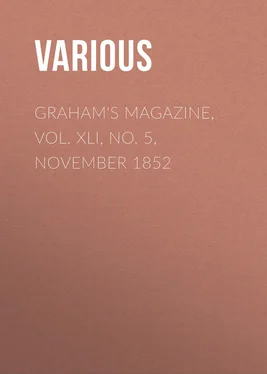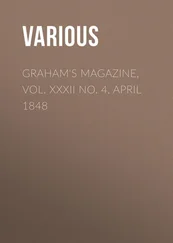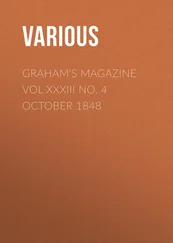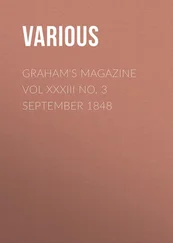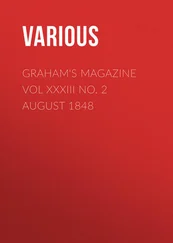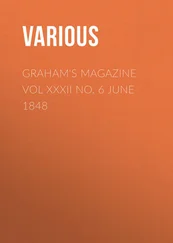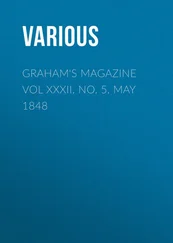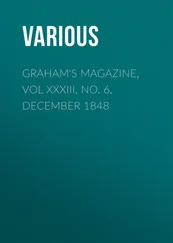Various - Graham's Magazine, Vol. XLI, No. 5, November 1852
Здесь есть возможность читать онлайн «Various - Graham's Magazine, Vol. XLI, No. 5, November 1852» — ознакомительный отрывок электронной книги совершенно бесплатно, а после прочтения отрывка купить полную версию. В некоторых случаях можно слушать аудио, скачать через торрент в формате fb2 и присутствует краткое содержание. Издательство: Иностранный паблик, Жанр: periodic, literature_19, foreign_edu, на английском языке. Описание произведения, (предисловие) а так же отзывы посетителей доступны на портале библиотеки ЛибКат.
- Название:Graham's Magazine, Vol. XLI, No. 5, November 1852
- Автор:
- Издательство:Иностранный паблик
- Жанр:
- Год:неизвестен
- ISBN:нет данных
- Рейтинг книги:4 / 5. Голосов: 1
-
Избранное:Добавить в избранное
- Отзывы:
-
Ваша оценка:
- 80
- 1
- 2
- 3
- 4
- 5
Graham's Magazine, Vol. XLI, No. 5, November 1852: краткое содержание, описание и аннотация
Предлагаем к чтению аннотацию, описание, краткое содержание или предисловие (зависит от того, что написал сам автор книги «Graham's Magazine, Vol. XLI, No. 5, November 1852»). Если вы не нашли необходимую информацию о книге — напишите в комментариях, мы постараемся отыскать её.
Graham's Magazine, Vol. XLI, No. 5, November 1852 — читать онлайн ознакомительный отрывок
Ниже представлен текст книги, разбитый по страницам. Система сохранения места последней прочитанной страницы, позволяет с удобством читать онлайн бесплатно книгу «Graham's Magazine, Vol. XLI, No. 5, November 1852», без необходимости каждый раз заново искать на чём Вы остановились. Поставьте закладку, и сможете в любой момент перейти на страницу, на которой закончили чтение.
Интервал:
Закладка:
If the count had seen the Quawks, as I did, at their high jinks, by the Hackensack, he would have scarce written such folly; and had he been a little more of a true philosopher, and thorough naturalist, he would have comprehended that whatsoever being the Universal Creator hath created unto any end – to that end he adapted him, not in his physical structure only, but in his instincts, his appetites, his tastes, his pleasures and his pains; and that to the patient Bittern, motionless on his mud-bank, that watch is as charming, as is the swift pursuit of the small bird to the falcon, of the rabbit to the fox, of the hare to the greyhound, of all the animals devoured to all the devourers; and that his frog diet is as dear to Ardea Lentiginosa , as his flower dew to the humming-bird, or his canvas-backs, in the tea-room, to an alderman of Manhattan.
As for the Bittern starving, eat a fat one in a pie, and you’ll be a better judge of that probability, than any Buffon ever bred in France; and as for all the rest – it is just French humbug.
At another opportunity, I may speak of others of this interesting tribe. Sportsmen rarely go out especially to hunt them, except in boats, as described by Mr. Giraud, but in snipe and duck-shooting in the marshes they are constantly flushed and shot.
Pointers and setters will both stand them steadily, and cocking spaniels chase them with ardor. Their flight is slow and heavy, and their tardy movements and large size render them an easy mark even to a novice. They are not a hardy bird, as to the bearing off shot; for the loose texture of their feathers is more than ordinarily penetrable, and a light charge of No. 8, will usually bring them down with certainty.
When wing-tipped they fight fiercely, striking with their long beaks at the eyes of the assailant, whether dog or man, and laying aside resistance only with their lives.
Early in the autumn is the best time both for shooting him and eating him, and for the latter purpose he is better than for the former; but for the noble art of falconry, the mystery of rivers, he is the best of all. Avium facile princeps ; easily the Topsawyer of the birds of flight, unless it be his cousin german heronshaw, whom the princely Dane knew from a hawk, when the wind was nor-nor-west.
WILD ROSES BY THE RIVER GROW
Wild roses by the river grow,
And lilies by the stream,
And there I pulled the blossoms fair
In young love’s happy dream.
The lilies bent upon the stem
In many a graceful twine,
But lighter was the slender form
Of her I dreamed was mine.
The wilding-rose hath fairer hues
Than other flowers have known,
But lovelier tints were on the cheek
Of her I called mine own.
I pulled my love the wilding-rose,
The lily-bell so frail,
Sudden the flowers were scattered far,
Reft by the envious gale.
So from my life was reft away
Love’s flower; I dwell alone,
Far severed by relentless fate
From her I called mine own.
Still by the river blooms the rose,
The lily by the stream,
I pull no more the blossoms fair,
Fled is love’s happy dream.
THE SONG-STREAM
“My right to love, and thine to know,
The life-stream, in its seaward flow,
Glides, chainless, ’neath the drifted snow.”
Wherever it listeth the free-born wind bloweth:
Wherever it willeth the stream of song floweth:
It revels in twin-light – its lone threads run single;
It passeth calm seas with wild Caspians to mingle.
If blest with true life-mate, in roughest of weather,
They join their glad voices and rush on together;
If lost in a lake whose fair surface is calmer,
It but hides in its bosom to warble there warmer.
If Spring lay a couch all enameled with flowers,
It lingers, enrapt, with the soft rosy hours,
And lists the wood-birds, and the meek insect-hummer,
Through the soft, growing idless of thought-teeming Summer.
And when Fall strews a carpet of brown o’er the meadow
It rests in the dusk of some mountain’s vast shadow;
Laughs out at the vain who look in for their faces,
For it mirrors great groups of the Nations and Races.
Though the Song-stream must cease all its rich, liquid flowing
When Time’s boreal breath o’er cold icebergs is blowing,
While closed the chill surface its depths who shall number,
Or the beats of its heart through the long polar slumber!
For the stream of true song hath a far-reaching mission;
It but gropeth while here, like sick sleeper in vision;
Or like volatile babe, its first word-lessons taking,
It catches faint glimpse of the vastness awaking.
As whither it listeth the free-born wind bloweth,
Wherever God willeth the true Song-stream floweth:
From all Dead Seas it holdeth its crystal wave single,
Till it riseth from earth with sky-dews to commingle.
MACHINERY, FOR MACHINE MAKING
Of all the leading characteristics of the present age, the most remarkable, and that which is evolving results of the greatest moment, is the general prevalence, and almost universal application of labor-saving machines, of one sort or another, which are gradually but surely bringing about a thorough revolution in all the forms of human industry.
Horse-power, man-power, nay! but almost wind and water power also, are rapidly becoming things almost obsolete and disused; while the giant might of the labor-imprisoned steam is pressed into services the most multifarious and diverse; now speeding the mighty ship with a regularity of time and pace exceeded only, if exceeded, by that of the chronometer; now whirling along, through the ringing grooves of iron, trains, the weight of which must be reckoned not by hundreds nor by thousands, but by tens of thousands of tons, measuring miles by minutes, and almost annihilating time and space; now drilling the smallest eye of the finest needle, turning the most delicate thread of the scarce visible screw, drawing out metallic wires to truly fabulous fineness, or spinning the sea island cottons of the South to threads, beside which the silkiest hair of the softest and most feminine of women waxes apparently to the thickness of a cable.
Henceforth it is apparent that of man, the worker, the skill and the slight, no more the sinews and the sweat, are to be called into requisition; that the head, and not the hand, is to be the chief instrument; that the intellectual and no longer the physical forces are to predominate, even in the merest labor.
To direct, not to wield, the power is henceforth to be the principal duty of the mechanic, even of the lowest grade; and in no respect is the progression, set in movement by the progress of science, more real than in this – that increased intelligence, increased capacity of comprehension, increased application to study, is hourly becoming more and more essential to the working-man of the present and the coming ages.
To be as strong as an elephant and as patient as a camel, with an average intelligence inferior probably to that of either animal, will no longer suffice to the swart smith, who now wields, by simple direction of a small spring or tiny lever, forces ten thousand times superior to any power that could be effected by the mightiest of sledge-hammers swung by the brawniest of human arms.
Читать дальшеИнтервал:
Закладка:
Похожие книги на «Graham's Magazine, Vol. XLI, No. 5, November 1852»
Представляем Вашему вниманию похожие книги на «Graham's Magazine, Vol. XLI, No. 5, November 1852» списком для выбора. Мы отобрали схожую по названию и смыслу литературу в надежде предоставить читателям больше вариантов отыскать новые, интересные, ещё непрочитанные произведения.
Обсуждение, отзывы о книге «Graham's Magazine, Vol. XLI, No. 5, November 1852» и просто собственные мнения читателей. Оставьте ваши комментарии, напишите, что Вы думаете о произведении, его смысле или главных героях. Укажите что конкретно понравилось, а что нет, и почему Вы так считаете.
